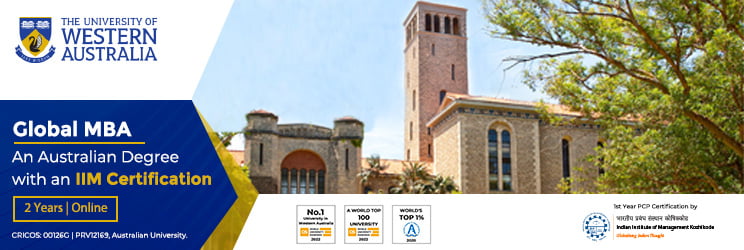Scope of MBA in HR in 2022-23: Top Job Roles and Skills

- What is an MBA in HR?
- What is the Scope of an MBA in HR?
- Common Subjects Included in the Curriculum of an MBA in HR
- Essential Skills You Develop After Completing an MBA in HR
- Top Job Positions You Can Take After Completing MBA in HR
- Why Can an MBA in HR be a Perfect Option for You?
- What After Completing an MBA in HR?
- How Can an MBA in HR Help Candidates Stand Out in the Job Market?
Human Resource (HR) professionals play a vital role in ensuring that organizations have the right people in the right roles and that those people are motivated and engaged. Pursuing an MBA in HR can be a great choice if you’re considering a career in this impactful field. It can provide you with the credentials you need to succeed in a career in this field. But what is the scope of an MBA in HR? Is it a good specialization for you? This career guide offers a comprehensive overview of the scope of an MBA in HR. Furthermore, it explores this sector’s core curriculum, key skills, job roles, and career opportunities. Read on to learn more about the potential of HR jobs in India.
What is an MBA in HR?
An MBA in Human Resources (HRM) is a specialized degree program that provides students with the necessary skills and knowledge to manage human resources within organizations. Additionally, the program focuses on equipping learners with the expertise to handle a wide range of tasks in the field. Through the course of the MBA, learners gain abilities such as designing and implementing effective recruitment strategies, developing talent acquisition plans, fostering positive employee relations, implementing performance management systems, and driving organizational change. Consequently, graduates of the HRM program are well-prepared to make informed decisions that contribute to the success and growth of their organizations.
Now that you know what an HRM entails, let’s examine the scope of an MBA for this specialization.
What is the Scope of an MBA in HR?
The scope of an MBA in HR is continuously expanding as organizations increasingly recognize the strategic value of effective HR management. Graduates of an MBA in HR are equipped with the ability to make significant contributions to organizational success. Furthermore, professionals with this degree can leverage their expertise to ensure that organizations meet their goals and objectives while also fostering employee satisfaction. Consequently, they can bring about positive change within organizations.
Moreover, professionals with an MBA in HR can pursue a wide range of careers. These include roles such as that of HR managers, talent acquisition specialists, and experts in organizational development, among others. They can also venture into entrepreneurship, establishing their own HR-related ventures such as consulting firms or training agencies. In the following sections, we take an in-depth look at the scope of MBA in HR.
Common Subjects Included in the Curriculum of an MBA in HR
Human Resource Management
HR management explores the fundamentals of workforce management, equipping students with the knowledge and skills to effectively manage and develop an organization’s human capital.
Marketing Management
This subject provides an understanding of the various aspects of the market and how to effectively promote products or services.
Accounting and Finance for Managers
Provides students with the knowledge and skills to effectively manage a company’s finances. This includes topics like financial statement analysis, budgeting, and financial decision-making.
Managerial Economics
This subject focuses on the planning phase of a business and helps students learn how to forecast demand, manage supply and demand, and set long-term business goals based on economic principles.
Industrial Relations Management
The responsibility here is to maintain harmonious relationships with various stakeholders in the industry. This includes labor laws, collective bargaining, and conflict resolution.
Compensation Management
This is crucial for understanding the workforce’s salary, wages, incentives, and fringe benefits. It includes topics such as compensation structures, performance-based pay, and employee benefits administration.
In addition to these core subjects, the scope of an MBA in HR, in terms of the curriculum, may also include electives such as organizational behavior, strategic human resource management, and global human resource management. These electives allow students to specialize in a particular area of HR or to gain a broader understanding of the field.
Essential Skills You Develop After Completing an MBA in HR
- Effective communication and interpersonal skills for building positive relationships with clients and employees.
- Project management expertise to plan and deliver HR projects efficiently.
- Analytical and problem-solving skills to address complex HR issues using data-driven approaches.
- In-depth knowledge of HR best practices, enabling effective strategy implementation.
- Understanding the business context provides valuable insights and aligns HR with organizational goals.
- Market and talent acquisition expertise for effective recruitment and talent management.
- Strong leadership skills to coach, mentor, and create a positive work environment.
- Data analysis to make informed decisions about HR practices.
- Strategic planning for aligning HR plans with organizational goals.
- Conflict resolution skills for managing employee conflicts effectively.
ALSO READ: What is MBA in HR (Human Resource)?
Top Job Positions You Can Take After Completing MBA in HR
- HR Specialist: They provide support to HR managers and other professionals in various HR areas such as recruiting, onboarding, training, and compensation.
- HR Manager: HR managers oversee the HR function within an organization, including developing and implementing HR policies, managing HR staff, and ensuring compliance with regulations.
- Employee Relations Manager: In this job role, one handles employee complaints, conflicts, and disputes to maintain a positive work environment and promote effective employee relations.
Why Can an MBA in HR be a Perfect Option for You?
HR professionals play a crucial role in organizations, fostering a positive work environment and ensuring employee satisfaction. According to the 2022 Corporate Recruiters Survey, 92% of corporate recruiters and 95% of staffing firms expressed their desire to hire MBA graduates. The survey also revealed that 87% of corporate recruiters expressed confidence in the ability of business schools to prepare students for success in their organizations. This high demand and strong belief in MBA graduates highlights the abundant career scope of an MBA in HR.
Furthermore, according to Ambitionbox, HR managers’ salaries in India range from ₹2,80,000 to ₹18,00,000, with an average annual salary of ₹6,60,000. These salary estimates show that MBA graduates in HR can have a rewarding career in the field. Thus, an MBA in HR can be an excellent pathway to achieve your goals.
What After Completing an MBA in HR?
After completing an MBA in HR, the next step is to explore and pursue exciting work opportunities that align with one’s career goals and interests. This may involve applying for HR management positions and gaining practical work experience in the field. Additionally, professionals can further enhance their expertise and stay updated in the field by enrolling in other HR courses.
ALSO READ: 7 Best MBA Programmes in the World
How Can an MBA in HR Help Candidates Stand Out in the Job Market?
An MBA in HR can help candidates stand out in the job market in the following ways:
- Provides a comprehensive understanding of the field of human resources
- Helps you develop your critical thinking and problem-solving skills
- Enhances leadership and communication abilities
- Offers networking opportunities with HR professionals, business leaders, and alumni
- Lastly, it demonstrates one’s expertise in the field and showcases a serious commitment to a career in HR, backed by the necessary knowledge and skills for success
This guide about the scope of an MBA in HR should encourage anyone who wants to make a positive impact and help businesses succeed to consider the program and chart a rewarding career.
By Krati Joshi






